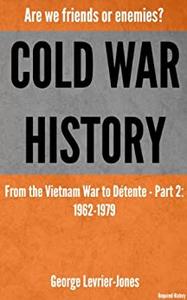
Free Download Cold War History - Are we friends or enemies? - From the Vietnam War to Détente - Part 2: 1962-1979 (Required History) by George Levrier-Jones
English | 2015 | ISBN: N/A | ASIN: B00DSV875I | 95 pages | EPUB | 0.31 Mb
Cold War History - Are we friends or enemies? - From the Vietnam War to Dйtente - Part 2: 1962-1979 (Required History)
In an unstable world, how do you know who your friends and enemies are?
You don't.
The Cold War was international affairs for the second half of the 20th Century. Nuclear weapons testing, civil wars in all corners of the globe and the race for economic dominance were all key spheres of the Cold War, although they were just a few elements of a very complex global puzzle. More so than the great battles between Carthage and Rome in Ancient times or the Napoleonic Wars, the Cold War defined our world. But, there was one key difference between the Cold War and earlier major wars. Due to advances in technology and communications, the Cold War touched most countries on earth.
This introduction to the middle years of the Cold War tells the story of the great clash between the Communist Soviet Union and the capitalist USA. It considers events in an intriguing age for international relations. Following the Cuban Missile Crisis, there were calls to avert the risk of another nuclear near-miss, and this did lead to an improvement in the super-power relationship; however, underneath this improvement, there remained great tension. To further complicate the situation, China and Europe both became increasingly powerful and assertive. In the world of the 1960s and 1970s, it was hard to know who to trust and who to fear.
The topics in the book include:
*The Vietnam War and its impact on the Cold War
*Decolonization and the opportunities that arose from it for the super-powers
*The growing power of Western Europe and a major change in Czechoslovakia
*The historic changes in the relationship between Mao Zedong's China and the super-powers
*The super-powers as friends? Dйtente, Richard Nixon, and Leonid Brezhnev
*The major nuclear agreements and the arms race
*How serious tensions emerged once more
